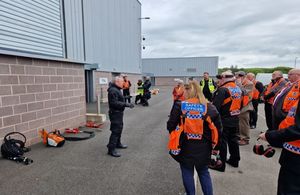Wales winners of Queen’s Award for Voluntary Service announced
The highest award given to local volunteer groups, the Queen’s Award for Voluntary Service, is being awarded to five organisations across Wales today in recognition of their outstanding community service.
Charities, social enterprises and voluntary groups in England, Wales, Scotland and Northern Ireland will receive the prestigious award for their volunteer-led work they have done across a wide range of fields including mental health, youth, community, arts and heritage.
This year 244 winners from across the country will receive the Queen’s Award, highlighting the continued breadth and depth of voluntary service undertaken each and every day across the United Kingdom.
The awardees have all carried out critical work to enhance the lives of others with the highest number of awards this year going to the community support sector which includes food banks, village shops, community events and men’s sheds.
Minister for Civil Society and Youth Nigel Huddleston said:
Thousands of volunteers in Wales give up their time every year and The Queen’s Award for Voluntary Service recognises their kindness.
People’s selfless generosity represents the best of the country and it is right that some of the most impactful groups and individuals have their tireless work recognised.
The awards are particularly notable in this special year of The Queen’s Platinum Jubilee.
Sir Martyn Lewis, QAVS Chair said:
I warmly congratulate all the outstanding voluntary groups who have been rewarded with a Queen’s Award for Voluntary Service this year. The level of commitment and innovation shown by these volunteers is truly impressive. We owe a debt of gratitude to them, and the countless others who give up their free time regularly to improve the lives of others in their community.
Empowering others is also an area well represented in this year’s Queen’s Award with confidence building, training opportunities, educational support, and sports all being highly recognised. Volunteers working in hospices, cancer support, long-term illness, search and rescue and first aid also feature prominently.
Coinciding with the Queen’s Platinum Jubilee celebrations, the Queen’s Award for Voluntary Service recognises that volunteers continue to provide a vital social function and continue to improve access to services across the country.
Secretary of State for Wales Simon Hart said:
Wales has a long-standing tradition of volunteers who put considerable time and passion into making their communities better for everyone. I’m so delighted that these efforts have been recognised by this prestigious award.
I’d like to congratulate the winners and take this opportunity to thank them for all that they do. Volunteers really do make a difference to our lives and we’re lucky that we have so many fantastic individuals who work tirelessly on behalf of others and contribute so much to our Nation”.
This year’s recipients include:
- Cymru Creations is a team of professionals who give their time to run an award-winning film academy, helping young people to create their own films and develop skills.
- The Corey Band is a long-standing and renowned brass band doing great work to engage and develop the next generation through its own academy.
- The Central Beacons Mountain Rescue Team which is providing a mountain rescue service to local people and visitors, as well as education talks to schools, youth groups and the public.
- Friends R Us Aberdare is a group providing an environment that is safe and inclusive where those struggling with social and mental health issues can relax and socialise.
- Neuadd Cwmllynfell Hall is a community hub providing a whole range of services to the whole community in an area of deprivation.
